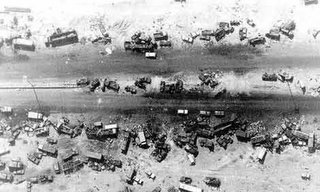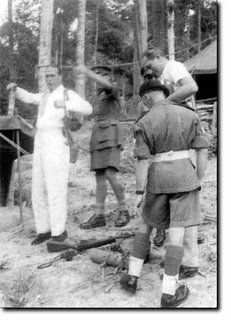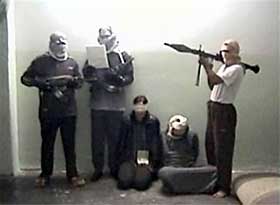Sunday, December 04, 2005
Losing Iraq. posted by Richard Seymour

It has been acknowledged by experts, think-tanks and intelligence sources for some time, but now leading generals and colonels admit it: the Iraqi resistance is a domestic affair, not a foreign import. They still insist on trying to locate 'ringleaders' of various kinds, which is probably related to the purview of a top-down hierarchical organisation - rather like how the police assume that demonstrations are led by secretive anarcho-evildoers, and company bosses can't imagine a strike in which some Bolshevik element is not manipulating the workers.
 Yet, for all that, the acknowledgment that they are facing a domestic revolt - and an expanding one at that - is important, and signals a new phase in the Iraq combat. On the one hand, as Alex Cockburn writes, the generals are getting a bit sick of throwing troops, finance and recruitment into the Iraqi abyss. It was evidently they who provided much of the script for Murtha's intervention in the House of Congress. The White House's rapid smearing of Murtha didn't stick, not least because it was clear that this was coming directly from the gnarly, blood-stained bastards who were actually out in the field of battle (or at least closer to it than Bush is), so they were obliged to say in short order that they were in fact preparing for some kind of staged withdrawal - but still no timetable.
Yet, for all that, the acknowledgment that they are facing a domestic revolt - and an expanding one at that - is important, and signals a new phase in the Iraq combat. On the one hand, as Alex Cockburn writes, the generals are getting a bit sick of throwing troops, finance and recruitment into the Iraqi abyss. It was evidently they who provided much of the script for Murtha's intervention in the House of Congress. The White House's rapid smearing of Murtha didn't stick, not least because it was clear that this was coming directly from the gnarly, blood-stained bastards who were actually out in the field of battle (or at least closer to it than Bush is), so they were obliged to say in short order that they were in fact preparing for some kind of staged withdrawal - but still no timetable.If the US government is not yet prepared to countenance withdrawal - which would be a catastrophic defeat for them - they are indulging some radical new options, as the Telegraph reports: Bush adopts British colonial model for Iraq. Now, the Telegraph is not the sort of august daily to disapprove of anything British, especially if it relates to our glorious imperial past - in this case, the suppression of the Malay rebellion. Rather, they will undoubtedly see it as a triumph of superior British imperialism over the vulgar fast-food Yankee cowboy way of war. Indeed, the article makes it clear that it means being nicer to Iraqis, making life so good that - by gosh - none of them would want to join any silly old insurgency.
 There are indeed many parralels with the British campaign in Malaya: the primary resource for exploitation in Malaya was rubber, while in Iraq it is some obscure energy resource that I forget the name of; colonialism in Malaya resulted in Western capital - mainly British - owning 70% of the acreage of rubber estates, while in Iraq...; the fall in rubber output during the Malay rebellion was put down to "communist sabotage", whereas in Iraq...; the British authorities ruthlessly bombed 'guerilla encampments, usually killing civilians...; the British authorities cracked down hard on trade unionists as part of their battle with rebels, while... well, look, you get the picture. One difference is that the US military has not yet - to my knowledge - taken to decapitating captured rebels, although the death squads being deployed at the moment have engaged in this practise. But what does the Telegraph mean when it says that the Americans are taking up the methods of Malaya?
There are indeed many parralels with the British campaign in Malaya: the primary resource for exploitation in Malaya was rubber, while in Iraq it is some obscure energy resource that I forget the name of; colonialism in Malaya resulted in Western capital - mainly British - owning 70% of the acreage of rubber estates, while in Iraq...; the fall in rubber output during the Malay rebellion was put down to "communist sabotage", whereas in Iraq...; the British authorities ruthlessly bombed 'guerilla encampments, usually killing civilians...; the British authorities cracked down hard on trade unionists as part of their battle with rebels, while... well, look, you get the picture. One difference is that the US military has not yet - to my knowledge - taken to decapitating captured rebels, although the death squads being deployed at the moment have engaged in this practise. But what does the Telegraph mean when it says that the Americans are taking up the methods of Malaya?Rather than focus on hunting down the enemy, the American-led coalition forces should be concentrating on securing specific towns and making life so good there that no one will want to support the insurgents, Col Krepinevich argues.
In time, the success will spread slowly outwards as if from an "expanding oil spot" or ink blot, as happened in Malaya. "You focus on a spot segment by segment, area by area," he said.
This measure is apparently approved by Bush, and his Iraq envoy Zalmay Khalilzad. What in fact happened in Malaya, however, was a brutal programme of 'resettlement' known as the 'Briggs Plan' - one hopes we won't have to remember its update as the 'Krepinevich Plan' - which the Colonial Office described as 'a great piece of social development'. Half a million Chinese squatters were forced into 'new villages', a process which the historian (and, ironically, friend of Richard Perle) Brian Lapping describes:
A community of squatters would be surrounded in their huts at dawn, when they were all asleep, forced into their lorries and settled in a new village encircled by barbed wire with searchlights round the periphery to prevent movement at night. Before the 'new villagers' were let out in the morning to go to work in the paddy fields, soldiers or police searched them for rice, clothes, weapons or messages. Many complained both that the villages lacked essential facilities and that they were no more than concentration camps. (Cited in Mark Curtis, Web of Deceit, Britain's Real Role in the World, 2003, pp 340-1)
 Naturally, the opposition cunningly twisted these kindly acts to make them appear as if they were somehow oppressive, because, according to the Colonial Office, the "Chinese mind" was vulnerable to the "twin stimuli of racialism and self-interest". As clear an instance of projection as you are likely to come across. Other methods used in Malaya included collective punishment, mass detention, and the use of chemical weapons - but these have already been tried in Iraq and have failed, just as they did when the British tried to control Iraq in the 1920s.
Naturally, the opposition cunningly twisted these kindly acts to make them appear as if they were somehow oppressive, because, according to the Colonial Office, the "Chinese mind" was vulnerable to the "twin stimuli of racialism and self-interest". As clear an instance of projection as you are likely to come across. Other methods used in Malaya included collective punishment, mass detention, and the use of chemical weapons - but these have already been tried in Iraq and have failed, just as they did when the British tried to control Iraq in the 1920s.Yet, for all that, withdrawal may yet come to be the least worst option for Washington. Some, perhaps sensing that the window of opportunity is closing, are doing their best to milk the situation for all it is worth. US businessmen are offering bribes for contracts, and the occupying authorities are on the take. Of course, the US has already got its plan for securing Iraq's oil for American corporations underway. Israel is training Kurdish peshmerga, still hoping to permanently infirm a united Iraq.
 By the way, if anyone has been watching this kidnapping story in Iraq, there's something deeply strange about the whole thing. The kidnappers are calling themselves either The Swords of Righteousness Brigade or The Swords of Truth Brigade - either of which could come directly from the Hollywood Tombola of Evil-Doers. No one has ever heard of them before. All the usual semiotic devices are present: dimly lit rooms, masked men, prominently displayed weapons, terrified and tired captives. Someone reads from a script - nudge nudge - and describes the captured peace activists as 'spies', which somehow sounds to me like something the puppet government would be more concerned about. Doubtless there will be any number of cod experts produced shortly to enlighten Western audiences about the resonances of swords and decapitations within Islam, but a more important question is how it resonates in the West. The whole set up is clearly designed to stimulate the fears and prejudices of non-Iraqis, although I note that there has been no report of religious-style language about "infidels". All of which leads one to suspect that either it is a criminal outfit seeking loot (plenty of those), or - gasp! - a Pentagon black ops. Of course, this is probably the work of fanatics, evildoers and various other kinds of miscreants, and this is just an idle thought, but it would not exactly be beyond the wit, or moral capacity, of those who organised the terror in Latin America to do it. Would it?
By the way, if anyone has been watching this kidnapping story in Iraq, there's something deeply strange about the whole thing. The kidnappers are calling themselves either The Swords of Righteousness Brigade or The Swords of Truth Brigade - either of which could come directly from the Hollywood Tombola of Evil-Doers. No one has ever heard of them before. All the usual semiotic devices are present: dimly lit rooms, masked men, prominently displayed weapons, terrified and tired captives. Someone reads from a script - nudge nudge - and describes the captured peace activists as 'spies', which somehow sounds to me like something the puppet government would be more concerned about. Doubtless there will be any number of cod experts produced shortly to enlighten Western audiences about the resonances of swords and decapitations within Islam, but a more important question is how it resonates in the West. The whole set up is clearly designed to stimulate the fears and prejudices of non-Iraqis, although I note that there has been no report of religious-style language about "infidels". All of which leads one to suspect that either it is a criminal outfit seeking loot (plenty of those), or - gasp! - a Pentagon black ops. Of course, this is probably the work of fanatics, evildoers and various other kinds of miscreants, and this is just an idle thought, but it would not exactly be beyond the wit, or moral capacity, of those who organised the terror in Latin America to do it. Would it?










